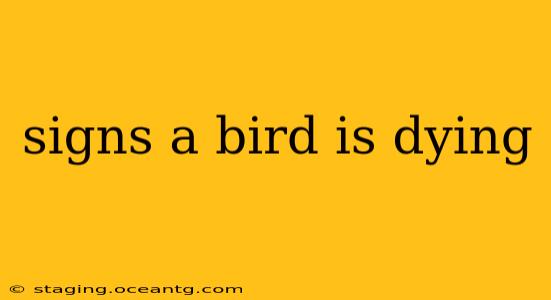Losing a bird, whether a wild creature you've been observing or a beloved pet, is heartbreaking. Recognizing the signs that a bird is dying allows you to provide comfort and, in some cases, potentially seek veterinary help. This guide explores various indicators of a bird's declining health, helping you understand their distress and make informed decisions.
What are the Signs of a Dying Bird?
Identifying the signs a bird is dying can be challenging, as they often mask their illness until it's advanced. However, several key indicators can alert you to their deteriorating condition:
-
Lethargy and Weakness: A dying bird will appear unusually lethargic, sitting still for extended periods and exhibiting a lack of energy. They may struggle to perch or maintain their balance. This profound weakness is a significant warning sign.
-
Difficulty Breathing: Observe the bird's breathing pattern. Rapid, shallow breathing, gasping, or open-mouthed breathing (especially in smaller birds) can indicate respiratory distress and a possible impending death.
-
Loss of Appetite and Dehydration: A significant decrease or complete loss of appetite is a serious sign. Dehydration, often manifested through sunken eyes and dry feathers, is another crucial indicator. The bird may be unable or unwilling to drink.
-
Loss of Coordination and Weakness: A bird struggling to fly, walk, or coordinate its movements is displaying a clear sign of physical deterioration. They may stumble, fall, or exhibit tremors.
-
Feather Ruffling and Dullness: Healthy birds generally maintain neat and glossy plumage. If the feathers appear ruffled, dull, or matted, it could indicate illness or stress contributing to the bird's decline.
-
Discharge from Eyes or Nose: Any discharge from the eyes or nostrils suggests an infection that may be weakening the bird. The discharge may be watery, thick, or colored.
-
Diarrhea or Droppings: Changes in droppings can signal intestinal issues. Frequent, watery, or abnormally colored droppings are concerning and often point towards underlying health problems.
-
Unusual Posture: Birds often assume unnatural postures when unwell. This could include sitting hunched over, holding one wing drooped, or resting on the ground instead of perching.
What to Do if You Find a Dying Bird?
The best course of action depends on the bird's condition and your local regulations.
-
Observation from a Distance: If you spot a bird displaying these symptoms from afar, simply observe it and allow it to rest undisturbed. Intervention might cause more stress.
-
Contacting a Wildlife Rehabilitator: For injured or sick wild birds, contacting a licensed wildlife rehabilitator is crucial. They are equipped to provide proper care and treatment.
-
Veterinary Care for Pet Birds: If you own a pet bird and it shows signs of illness, seek immediate veterinary attention.
-
Providing Shelter and Water (with caution): Only if the bird is accessible and seems receptive to assistance, you might offer a small amount of fresh water in a shallow dish. Avoid forcing interaction or handling unless you are experienced in handling birds.
How Can I Prevent My Bird from Dying?
Proper care significantly reduces the risk of illness and premature death in pet birds:
-
Balanced Diet: Provide a species-appropriate diet that fulfills all their nutritional needs.
-
Clean Environment: Maintain a clean cage or aviary to minimize the risk of infection.
-
Regular Veterinary Check-ups: Schedule regular check-ups with an avian veterinarian for preventative care.
-
Stress Reduction: Minimize stress by providing a secure and enriching environment.
What are the Common Causes of Death in Birds?
Several factors can contribute to a bird's death:
-
Disease: Infections, parasites, and other diseases significantly impact birds' health.
-
Injury: Collisions with windows, attacks by predators, and other injuries can prove fatal.
-
Malnutrition: Inadequate nutrition weakens the immune system and makes birds more susceptible to illness.
-
Poisoning: Exposure to toxins such as pesticides or lead can lead to illness and death.
Remember, while we can't prevent all deaths, attentive care and understanding of the signs of distress can significantly improve the well-being and longevity of your feathered friends. If you're ever unsure about a bird's condition, it's always best to seek professional advice.
